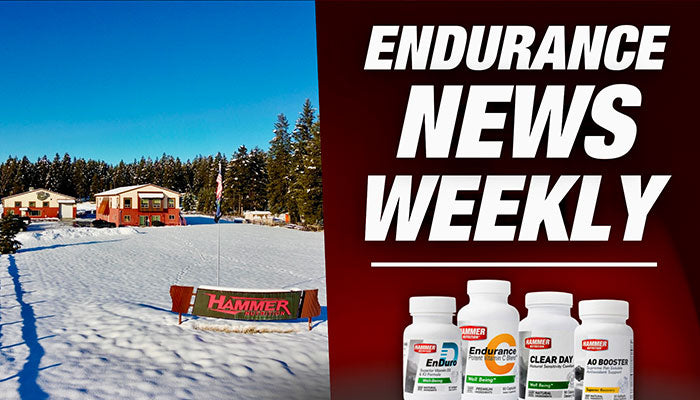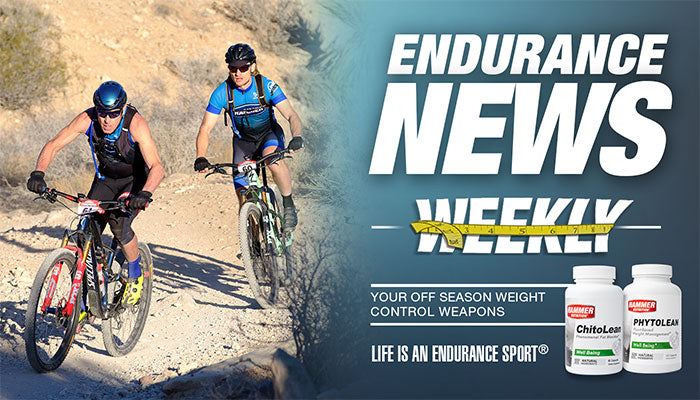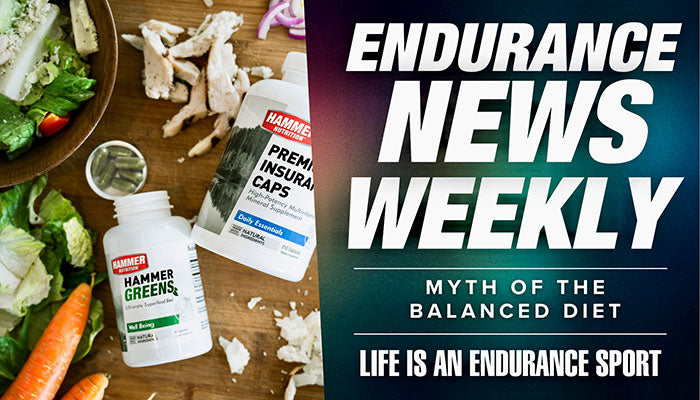What’s your MCPH?
BY BRIAN FRANK
Hey, Hammer fans!
Brian Frank here talking about a really important subject. “Got to get this off my chest before I explode," as the old headline used to read. For 36 years, I've been dealing with the question of how many calories per hour one should consume when exercising, be it an hour, 3 hours, 6 hours, or 12-hour multi-day events. Hint – Less is BEST!
Hammer on.
This question vexes many athletes, and unfortunately, there is so much myth and misinformation surrounding it. The high-calorie crowd, as we call them, the experts of the day, were saying the same thing about how many calories per hour, with some going as high as 400, even 600! Silliness!
Maybe that's what you're burning. Doesn't really matter. You can't consume anywhere near that much. So, now we have a whole new generation of research, sort of. The outcome of a couple of questionable studies touting 60 to 90 grams an hour of carbohydrate is the basis for the "new" 60-90 grams per hour or recommended intake. Take a closer look at that research - Test subjects operate at 50% of max watts! What?
That's right. Participants are walking along at a 95 beats per minute heart rate, not so much. We're constantly exercising at a much higher heart rate than that.
You've probably tried higher calorie intake and had GI distress, plus all kinds of fun problems that go with it. So we invented this concept that less is best for optimal fueling in response to constantly dealing with athletes suffering from overconsumption of calories. So I have a little system I call the minimum calories per hour - MCPH.
MCPH is the number you want to know. You want to determine your minimum calories per hour that allows you to exercise at the limits of your ability and fitness, not slow down, and not suffer GI distress or any other cramping problems. It comes down to about one calorie per pound of body weight for most athletes.
That usually ends up being the sweet spot, plus or minus a few. So, for most athletes, we're talking 100 to 180 calories an hour. Nowhere near this 240 to 360 calorie craziness we're hearing. This high-calorie take also contradicts human physiology. We know that the human liver can return about 1 gram of carbohydrate per minute into Glycogen.
So there you go. Four calories per gram, times 60 minutes in an hour, equals a 240-calorie per hour theoretical ceiling. So why try to exceed that? And more to the point, why try to stuff so many calories down your throat when you just want to go pedal, swim, bike, run, whatever?
So do that and consume a lot less calories. You'll be happier, your stomach will be happier, and you can forget about all the high-calorie fuss and mus. So less is best. 100-180 calories an hour. One calorie per pound of body weight, and you'll be in the ballpark.











21 comments
Hi Brian… Looks like you’re getting into the video blog space which is great. Thanks as usual for some relevant information. I’m just an older guy (65) who wants to live a long active life and your products really help me do that! I’m your biggest proponent when I’m amongst my hiking/biking friends.
I have one suggestion. Maybe it’s because I’m a trained photographer but viewing a video in portrait is much less pleasurable than in landscape. JMHO
Thanks for providing all your great products and info!
Steve
———
Hammer Nutrition replied:
Hi Stevo! Thank you for your comment and suggestion, but more for your support and advocacy! I really appreciate you. I started doing videos last year, one take, unscripted, just “being frank” and people seem to like them, so I’ll keep making more. Since the beginning, I’ve been endeavoring to provide the information and data needed to put my products, or any other, and all of your hard work in training to the best effect possible when exercising. That’s why I started publishing Endurance News back in 1992. These days, seems hard to get anyone to read anything, so I’d doing videos too. I hear what you are saying and totally agree, for tablet/laptop/desktop users on the landscape video format. Unfortunately, most of our “views” come from mobile devices. As you well know, people much prefer portrait style videos when watching on their phone. I do agree though that some of my key videos, like the 5 SOS series that are embedded on our site should be re-done in land scrape format. Thank you again for the suggestion. Keep Hammering! BDF
Saturday, June 15th I start my 22nd RAAM, Team Skipper – 60 plus men’s team. This helps me verify what I felt and what I have learned, sometimes the hard way that if I take too many calories my stomach does get upset and that also seems to affect my body’s ability to keep a proper balance of electrolytes. Thanks. Tim Skipper
———
Hammer Nutrition replied:
Hi Tim, thank you for your comments and congratulations your RAAM legacy. I appreciate your affirmation that Less is Best – you can always add more calories, but not so fun to take them out if you get too many! Steve and I will be available if you, your team mates or crew need any guidance before or during the event. Keep on hammering! BDF
Great article, thank you for being concise with the baseline numbers, much appreciated, as is so much other information here. One point to consider is that not everyone undertakes high-energy endurance activity – some people use Hammer products for endurance hiking for example which is lower-level (perhaps indeed 95 heartrate) for much of the day for days on end. So total intake matters as another commenter noted, and with the lower heartrate perhaps higher intake (up to liver’s limit) can be processed? I’ve (175lb) consumed 1 Heed (110cal) plus approx. the same in gel/snacks per hr during long hikes without buildup in the digestive tract.
Thanks again, love Hammer products, surprised there is not more presence in the backpacking community.
———
Hammer Nutrition replied:
Hi Scott, thank you for your comments. My article/video is intended for all multi hour exercise efforts of every intensity, hiking/backpacking included. There are many factors to consider on this subject and rate intensity is certainly a big one. As I noted, typically the higher the rate of intensity, the fewer calories can be processed. However, lower intensity efforts allow for a higher % of body fat to be utilized, so actual calorie replacement can be lower. Yet another factor is your metabolic state at the onset of exercise. If one is in the middle of digesting a meal because they ate 60-90 minutes before the start, they won’t be burning any appreciable amount of fat for at least the first hour or two, which causes premature depletion of muscle and liver glycogen stores and so on. My point is that I do not think you need anywhere near 200 calories per hour for a moderate pace hike. I encourage you to follow the 3 hour pre-exercise meal timing and reduce to 150-160 calories per hour on the trail. I think you’ll feel lighter and stronger, but you be the judge. BDF
Thanks!! I finally get it!! I’ve been using Hammer for years due to the information in “The Endurance Athlete’s Guide to Success”, but the light bulb finally came on from reading this. Although this explains the calorie intake, I’ll presume there’s a guideline for hydration in an hour and that everyone is different? My hydration would include the approximate 28 oz. I’m consuming from the Heed/Perpetuem. (I’m 69, 5’8", 162 lbs.) I do realize ambient temperature plays a role in the amount consumed. I’ve found if I drink 28 oz., within an hour I’ll be looking for a pit stop tree somewhere along the route within 75 – 80 minutes from the start of my ride. Would that be an indicator I’m drinking too much? If so, I can reduce the amount of water in the mixture so I’m still consuming the appropriate amount of calories per hour. Or, should I err on the conservative side and presume those pit stops are telling me I’m drinking enough and just live with the annoying pit stops? Suggestions? Thanks!!
———
Hammer Nutrition replied:
Hello Rick, thank you for your comments and questions. You are correct, I talk separately about fluid intake as it can vary much more than caloric intake. People actually are pretty much the same in how they process fluids. Several factors affect all athletes the same – first being body size/weight. A 100 pound athlete must consume less fluids than a 162 pound athlete like yourself. Ambient temperatures and ones acclimatization are the biggest factors. If you start your ride at 6-7 am and it’s quite cool, hardly sweating, most fluid loss coming from respiration. Drinking more than 12-14 per hour at those temps would be where you want to be. However, as the ride progresses, heat stress increases, fluid intake would be to increase accordingly, gradually increasing hourly intake to perhaps 22-26 oz per hour when during the hottest part of your ride. The larger goal is to be effectively hydrating all day, every day – meaning ½ to ¾ oz per pound of bodyweight daily, exlclusive of what you consume while training. 80 oz/day is your minimum. Try to get that much between waking and 3 hours prior to bed. Call, live chat or email directly to discuss further. BDF
I love your products! I’ve been using the gels for years as a triathlete but have only recently started taking advantage of your research and literature. It’s excellent! Clear, smart and easy to digest… just like all your products! Thanks for all you do!!